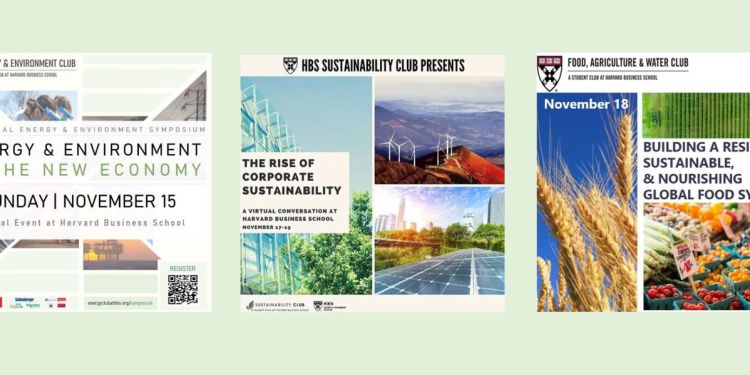In November 2020, three HBS student clubs hosted three separate virtual conferences that drew over 600 attendees, demonstrating the strong and growing interest in the critical connection between business and the environment among HBS MBAs. Each of the themes, while distinct, all focused on the changes that businesses across sectors will have to make in order to confront challenges from climate change.
Energy & Environment Club: Energy and Environment in the New Economy
Leading off the week was the Energy & Environment Club’s 17th Annual Symposium, “Energy and Environment in the New Economy”. The virtual symposium attracted over 500 professionals across academia and industry, from investors to policy makers, to engage in discussion, debate, and share ideas about the future of energy in a new economy shaped by COVID, recession, and the climate crisis.
High profile leaders from across business, finance, tech, entrepreneurship, and policy joined panels spanning an array of topics from energy policy and circular economy to breakthrough innovations and investing. Industry expert Ted Wiley, Co-Founder, President, & COO of Form Energy, shared his insights about emerging technologies and business models that his and other companies are exploring to prepare for the energy transition and mitigate climate change. One session featuring Susan Morrice, CEO, Co-Founder, and Chairperson of Belize Natural Energy, addressed how incumbent energy companies are preparing to face the energy transition, while another session with Lauren Faber O’Connor, Chief Sustainability Officer for the City of LA Mayor’s Office explored urbanization and the future of the grid.
In between sessions, the Club encouraged networking in a virtual lounge where students and professionals could connect for informal discussions as well as explore the Exhibition Hall, where organizations set up virtual information booths. In addition, the Startup competition showcased cutting edge energy entrepreneurs and their innovative solutions, providing the attendees a glimpse into the future of energy. This year the winner of the competition was Boston Meats, a new startup based in Boston whose mission is to make delicious, nutritious, and affordable alternative meats.
A key takeaway from the day was the importance of advancing technology and finance in tandem: “You can’t make change if you are not investing in change,” said Maarten Wetselaar of Royal Dutch Shell. Students and attendees alike ended the evening more inspired and motivated to create change and transform the energy ecosystem into a more sustainable and equitable one for future generations.
Food, Agriculture, & Water Club: Building a Sustainable, Resilient, and Nourishing Global Food System
"Building a Sustainable, Resilient, and Nourishing Global Food System" was the 2nd annual conference hosted by the Food, Agriculture, and Water Club. The Club invited 22 industry experts from firms across the food value chain to share how they are navigating the global pandemic while innovating solutions to address climate change, resource constraints, and nutritious food accessibility. The conference highlighted the approaches that 12 different companies are using to change the landscape of food systems to become more sustainable.
The first panel demonstrated how four companies are each working differently to address climate change by reducing their impact, from promoting a plant-based diet to investing in regenerative agriculture. The resiliency panel featured businesses with unique agricultural innovations such as developing urban rooftop farms to help feed a growing population using fewer resources and a smaller footprint. The final panel consisted of four companies which are working tirelessly to increase global access to nourishing food through innovations such as using technology to develop better fruits and vegetables and cultivating nutritional value through plant breeding.
The conference keynotes, Ndidi Nwuneli (MBA 1999), CEO of Sahel, and Eric Soubeiran, Managing Director of Danone Ecosystem Fund, shared their cautious optimism for the future of the food, water, and agriculture industries in the face of growing environmental challenges. Concluding the conference, Eric Souberiran underscored the importance of young entrepreneurs tackling these complex issues and that “there is a huge opportunity when you protect resources to generate value- that is where our system can be changed. And that is why food and water is the perfect sector to bridge sustainability and business vision”.
Watch highlights from the Food, Agriculture, and Water Club Conference:
Sustainability Club: The Rise of Corporate Sustainability
“The Rise of Corporate Sustainability” was the Sustainability Club’s first major conference since its founding in 2019 – and brought in over 200 unique viewers for a series of engaging conversations among groundbreakers in the field.
Over three consecutive evenings, students and alumni were invited to hear from the leaders of companies at the leading edge of sustainability, ranging from marketing-leading companies harnessing their market power to drive massive difference at scale, to smaller companies developing trailblazing new innovations to serve the new economy. The conference launched with a keynote from Anne Simpson, CalPERS Managing Investment Director for Board Governance and Sustainability with a Q&A led by BEI faculty chair Mike Toffel, where the role of regulation, fiduciary duty, and managing for sustainability at one of the world’s largest pension funds was discussed in detail. This opening was followed by in-depth discussions with Chief Sustainability Officers of Walmart, Nike, PepsiCo and Morgan Stanley, led by Professor Rebecca Henderson, and a policy debate led by Professor Gunnar Trumbull. The conference was capped off with breakout sessions on circular economy, environmental markets, and sustainable finance.
The conference was an important moment in the MBA education on key topics of sustainability. Mike Kelly (MBA 2022) is confident in the direction that businesses are headed and the opportunities for students to leverage their careers to build a more sustainable world: "Corporations both large and small are working harder than ever before to measure their emissions, and it is encouraging to see companies actually using these metric to make better decisions - from making sustainable procurement choices, to using renewable energy to power server farms. For MBA students looking for careers in sustainability, there has never been a better time!"

